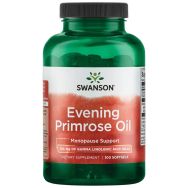Does Evening Primrose help with PMS and other conditions?

Evening Primrose Oil (EPO) is a plant native to North and South America, and found now in some parts of Europe and Asia. It is a small, yellow-flowered plant whose seeds contain alpha-linoleic acid and gamma alpha-linoleic acid (ALA and GLA). These are both types of essential fatty acids, which means they cannot be produced by the body. We need fatty acids for a variety of functions, such as in cell membranes.
EPO is most commonly found in capsule form, and sometimes tablet form. The most popular dose is 500mg per day. EPO has been historically used as a remedy for haemorrhoids and eczema. In recent years, EPO has become a popular supplement for a variety of other conditions.
In this article, I provide an overview of the four most popular health claims of EPO to help you understand what the evidence says.
Common conditions associated with Evening Primrose Oil
EPO is a commonly cited supplement in many online health websites. Some of the most popular claims include:
- Helping ease premenstrual syndrome (PMS)
- Easing menopause symptoms, in particular hot flashes
- Helping with breast pain
- Reducing blood pressure
Does Evening Primrose Oil help with these symptoms?
-
PMS symptoms
EPO is very often linked to being a remedy for alleviating symptoms of PMS. PMS is a condition with emotional and behavioural symptoms in the days leading up to the start of a period. Around 85% of people who menstruate experience PMS (1). There are over 150 symptoms of PMS. Including headaches, backache, irritability, and appetite changes. PMS is thought to be caused by low levels of progesterone after ovulation occurs. Progesterone prepares the body for pregnancy. So if no conception happens, progesterone levels drop. This drop causes the symptoms of PMS.
The evidence for EPO as a remedy for PMS is uncertain, and more high-quality research is needed to understand the relationship.
A 2019 review of randomised controlled trials found EPO daily reduced PMS severity. Both studies used different doses of EPO; one used 180mg and the other used 1.5g. A higher amount of EPO did not seem helpful for PMS.
A randomised controlled trial looked at the effect of EPO on university students. The dose used was 1.5g per day, which was taken daily for three months. Those taking the EPO daily reported a large reduction in PMS symptoms. In particular, they had reduced fatigue, irritability, and low mood (2). However, at the follow-up after three months, those who had taken EPO had similar symptom severity to those who hadn't. This suggests that EPO might be effective for PMS, but the effects only last for as long as it is taken.
-
Hot flashes in menopause
Menopause is the point 12-months after someone’s final period. This, on average, happens at around age 51. In the years leading up to this is when people have menopause symptoms. There are around 20 common menopause symptoms, with the most common being hot flashes. Other symptoms include fatigue, night sweats, irritability, and appetite changes. EPO is one of the most popular remedies for hot flashes in people going through the menopause. So what does the evidence say about it?
A 2013 randomised and placebo controlled trial gave participants 500mg of EPO every two days. Effectiveness was measured by the severity and length of hot flashes experienced. It was found that in those taking EPO, no difference in hot flashes was found. But, the interference that hot flashes had with daily life decreased in those taking EPO. This included social activities, relationships, and general feeling of wellbeing (3). This study looked at the effect of EPO on only 23 people, so larger studies are needed to investigate these results further.
An older study from 2007 did have a larger number of participants. This was a survey-based study that asked 1,300 people about the effect herbal remedies had. Around 66% of people said that EPO was effective in reducing the severity of hot flashes (4). However, this study was limited. It is not known how long those surveyed had been taking EPO for. Or how severe their symptoms were before taking it, and what other methods of hot flash management they had done.
There are also claims that EPO can offer estrogen replacement during menopause. This is however not backed by the evidence. The only method of estrogen replacement is hormone replacement therapy (HRT) which should be discussed with your GP (5)
-
Breast pain
Mastalgia is dull, achey, or sharp pain in the breast. It affects around 70% of people with breasts in the UK each year. It can be a symptom of PMS or menopause, but it can be due to other reasons too. Including sprains, side-effects from medications like the contraceptive pill, pregnancy, mastitis, or abscess. Since breast pain is so common and can be due to a variety of reasons, EPO has been attributed to it. However, there is only one known study currently to support claims.
A 2019 review of the use of EPO for breast pain found mixed results. The studies in this review ranged in doses of EPO, from 180mg to 6g per day. It seems that a higher dose of EPO means a reduction in breast pain severity. However, there are also studies where lower doses had more reduction in breast pain (1). The authors of this review reported this may be why results are mixed. Therefore more randomised clinical controlled trials are needed with consistent doses of EPO.
-
Lower blood pressure
EPO is listed on many health websites for helping to reduce blood pressure. But actually there is very limited evidence this is the case. High blood pressure is very common, affecting around 1 in 7 people. EPO is proposed to help reduce blood pressure due to the fatty acids content. This is thought to decrease constriction in the arteries and allow blood to flow easier.
A 2008 survey-based study looked at the supplements almost 9,700 were taking. This was compared with their blood pressure recorded from their most recent measurement. The supplements reported included EPO, co-enzyme Q10, and fish oil. EPO was reported to have the largest effect on blood pressure out of the other supplements. This is based on those who took EPO and had lower blood pressure (7). The participants' survey results were separated by many factors. Including age, gender, and other co-occurring health conditions.
This study was limited in various ways. Firstly, the study did not account for other factors that influence blood pressure. This includes things like diet, exercise, stress. It included factors people have little control over. Including their socioeconomic status, how much stigma they face in their lives, and pre-existing health conditions. The study is a snapshot in time - the long-impact of EPO on blood pressure is unknown as there was no follow-up. Lastly, the blood pressure measurement could have been any length of time ago. It may have been within the last month for some, and for others within the last ten years. While this study suggests some link with blood pressure and EPO, there is too much variability and unknowns. Therefore no recommendations can be made yet.
Is Evening Primrose Oil safe for everyone?
Before taking EPO, or any supplement, it is important to speak with your GP. This is because there may be interactions between medications.
EPO is not recommended for various people, including:
- Those who take warfarin, as EPO has a blood thinning effect.
- EPO should not be taken alongside other medications that thin the blood. This includes aspirin.
- Those with epilepsy or other seizure disorders should avoid EPO. This is because EPO can increase the risk of seizures.
- People who take medications for schizophrenia should speak with their GP before taking EPO. There may be interactions between common medications and EPO.
- Those who have gone under anesthetic within the last two weeks. This is because EPO can increase seizure risk.
- Those who are pregnant or breastfeeding should not take EPO. The impact of EPO on fetuses is unknown.
Summary
- EPO is commonly listed on various health websites as a remedy for health conditions. However, there is mostly little research to back up these claims.
- The most common conditions EPO is associated with are: PMS, hot flashes in menopause, breast pain, and high blood pressure.
- EPO is linked to a reduction in PMS, hot flashes, and high blood pressure. However, much more research is essential before any claims can be made.
- Breast pain has even more mixed results. A review found that some people’s breast pain was helped with EPO, but others was not. Therefore more research is needed to investigate the use of EPO for breast pain.
- There are a variety of conditions and medications where people should not take EPO. Before taking any new supplements, it is key to speak with your GP first.
Product recommendation: Evening primrose oil 500mg. I have chosen 500mg as this is the most commonly used dose in studies. The upper limit of EPO is not currently known, so the higher dose options may be unsuitable.
References
- Mahboubi, M. (2019) Evening primrose oil in management of female ailments. J Menopausal Med. 25(2): 74-82.
- Saki, M. (2015) The effect of evening primrose oil on the premenstrual syndrome among the female students in Lorestan University of Medical Sciences: A triple blind study. Journal Nursing and Midwifery Science. 2(1): 20-26.
- Farzaneh, F. et al. (2003). The effect of oral evening primrose oil on menopausal hot flashes. Arch Gynae Obstetric. 288(5): 1075-1079.
- Patcher, C. et al. (2007) Women's health during mid-life survey: the use of complementary and alternative medicine by symptomatic women transitioning through menopause in Sydney. Menopause. 14(1): 397-403.
- NHS. (2019). Breast pain. [Accessed: 13/12/21].
- McCarty, C. et al. (2013) The use of dietary supplements and their association with blood pressure in a large Midwestern cohort. BMC Contem and Altern. Medicine. 13 (Article 339).













